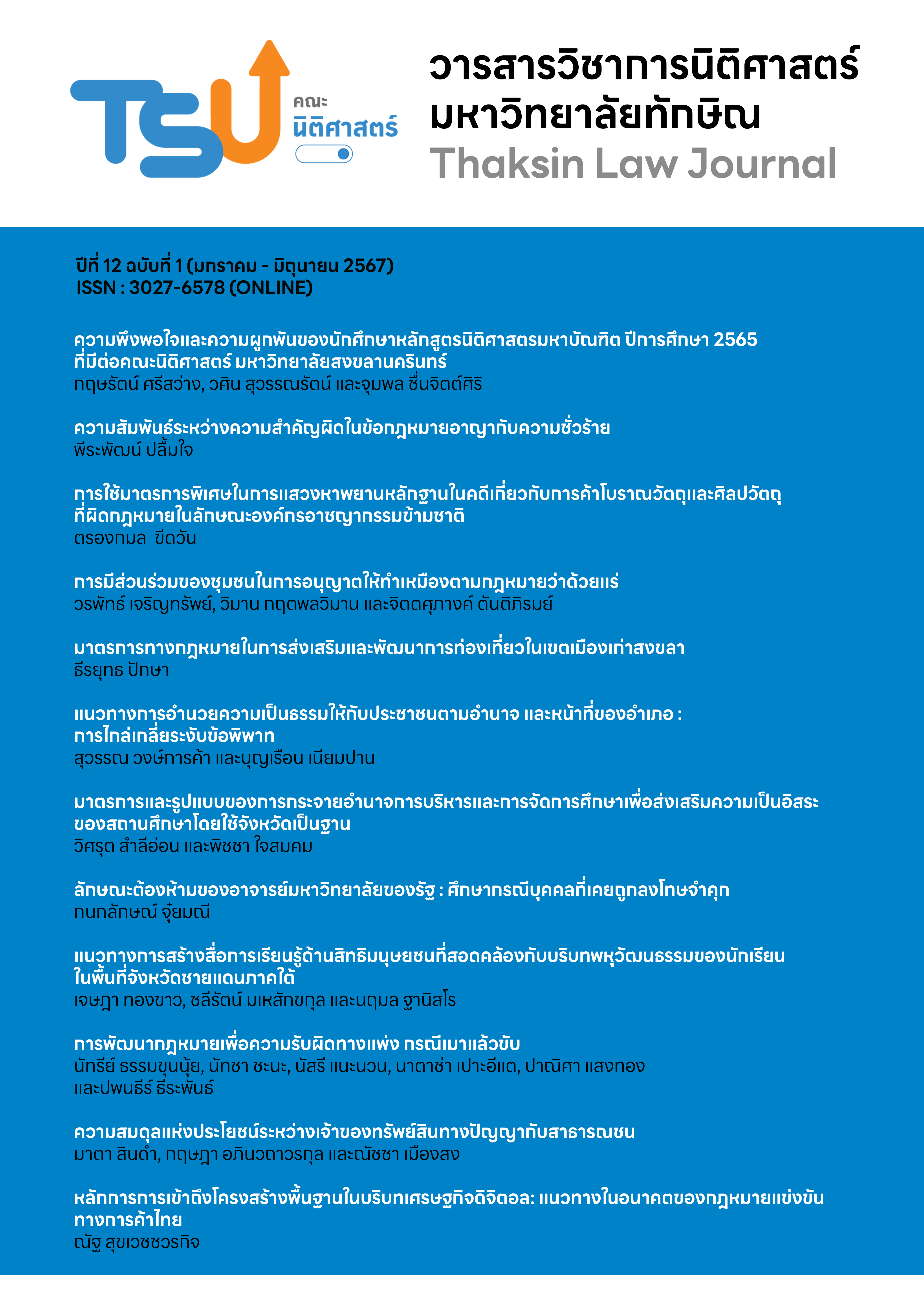หลักการการเข้าถึงโครงสร้างพื้นฐานในบริบทเศรษฐกิจดิจิตอล : แนวทางในอนาคตของกฎหมายแข่งขันทางการค้าไทย
บทคัดย่อ
งานวิจัยนี้ได้ทำการศึกษาหลักการเรื่อง Essential Facility Doctrine (EDF) หรือ หลักการการเข้าถึงโครงสร้างพื้นฐาน ความสำคัญต่อระบบเศรษฐกิจดิจิตอล และประโยชน์ที่ประเทศไทยจะได้รับหากมีการยอมรับและบังคับใช้หลักการนี้ภายใต้กฎหมายแข่งขันทางการค้า หลักการ EFD คือแนวความคิดของกฎหมายแข่งขันทางการค้าที่บังคับให้ผู้มีอำนาจผูกขาดในโครงสร้างพื้นฐานหรือทรัพยากรที่สำคัญต้องยอมให้ผู้ประกอบการหรือคู่แข่งคู่ค้ารายอื่น ๆ สามารถเข้าถึงและใช้สอยซึ่งโครงสร้างพื้นฐานหรือทรัพยากรที่สำคัญนั้น ๆ ได้เพื่อการแข่งขันทางการค้าที่เป็นธรรม งานวิจัยนี้ได้แสดงให้เห็นถึงความซับซ้อนของการใช้หลักการ EFD ในยุคเศรษฐกิจดิจิตอลที่หน่วยงานด้านกฎหมายแข่งขันทางการค้าจะต้องเผชิญ นัยยะสำคัญของการไม่ยอมรับและบังคับใช้หลักการนี้ในประเทศไทย และประโยชน์ที่ประเทศไทยจะได้รับหากยอมรับและบังคับใช้หลักการนี้ อาทิ เป็นการส่งเสริมประสิทธิภาพการแข่งขันทางการค้า ส่งเสริมนวัตกรรม การลงทุน และสอดคล้องกับหลักปฏิบัติของกฎหมายทางการค้าในสากลโลก งานวิจัยนี้ยังได้ทำการศึกษาการใช้หลักการ EFD ที่ประสบความสำเร็จจากประเทศญี่ปุ่น เกาหลีใต้ และแคนาดา เพื่อเป็นตัวอย่างและเป็นการพิสูจน์ให้เห็นถึงผลประโยชน์ที่ประเทศไทยจะได้รับหากยอมรับและบังคับใช้ซึ่งหลักการนี้โดยเฉพาะในบริบทของเศรษฐกิจดิจิตอล งานวิจัยนี้ได้นำเสนอเพิ่มเติมเกณฑ์การใช้หลักการ EFD ในประกาศคณะกรรมการการแข่งขันทางการค้าเรื่องแนวทางปฏิบัติในการพิจารณาการกระทำต้องห้ามของผู้ประกอบธุรกิจซึ่งมีอำนาจเหนือตลาด พ.ศ. 2561
เอกสารอ้างอิง
Areeda, P., & Hovenkamp, H. (2012). Antitrust law: An analysis of antitrust principles and their application (4th ed.). Aspen Publishers.
Blair, R. D. (1993). The essential facility doctrine revisited. The Yale Law Journal, 102(6), 1887-1932.
United States v Terminal Railroad Association, 224 US 383 (1912).
Case COMP/C-3/37.792-Deutsche Telekom. Official Journal of the European Union, L204/1.
Ezrachi, A., & Stucke, M. E. (2016). Virtual competition: The promise and perils of the algorithm-driven economy. Harvard University Press.
European Commission. (2018). Proposal for a regulation of the European Parliament and of the Council on promoting fairness and transparency for business users of online intermediation services. Brussels.
Evans, D. S., & Schmalensee, R. (2016). Markets, competition, and the role of technology. Journal of Competition Law & Economics, 12(1), 1-37.
European Commission. (2017). Commission communication on tackling illegal content online. Brussels.
Motta, M. (2004). Competition Policy: Theory and Practice. Cambridge University Press.
Whish, R., & Bailey, D. (2018). Competition Law. Oxford University Press.
Srisuwan, S. (2015). Competition law and policy in Thailand. In K. E. Maskus & E. S. Olson (Eds.), Handbook on competition law and policy. Edward Elgar Publishing.
พระราชบัญญัติการแข่งขันทางการค้า พ.ศ. 2560
ประกาศคณะกรรมการการแข่งขันทางการค้าเรื่องแนวทางปฏิบัติในการพิจารณาการกระทำต้องห้ามของผู้ประกอบธุรกิจซึ่งมีอำนาจเหนือตลาด พ.ศ. 2561
Treaty on the Functioning of the European Union.
Jones, A., & Sufrin, B. (2019). EU Competition Law: Text, Cases, and Materials. Oxford University Press.
Case C-241/91 P: Radio Telefis Eireann (RTE) v Commission of the European Communities [1995] ECR I-00743.
Case C-242/91 P: Independent Television Publications Ltd (ITP) v Commission of the European Communities [1995] ECR I-00743.
Case C-7/97: Oscar Bronner GmbH & Co KG v Mediaprint Zeitungs- und Zeitschriftenverlag GmbH & Co KG [1998] ECR I-7791.
Case T-201/04: Microsoft Corp v Commission of the European Communities [2007] ECR II-3601.
European Commission. (2007). Guidance on the Commission's Enforcement Priorities in Applying Article 82 EC Treaty to Abusive Exclusionary Conduct by Dominant Undertakings.
Hovenkamp, H. (2011). Federal Antitrust Policy: The Law of Competition and Its Practice. West Academic Publishing.
MCI Communications Corp v AT&T, 708 F 2d 1081 (7th Cir 1983).
Pitofsky, R. (1993). The Essential Facilities Doctrine Under U.S. Antitrust Law. Antitrust Law Journal, 70 (2).
U.S. Department of Justice and Federal Trade Commission. (2017). Antitrust Guidelines for the Licensing of Intellectual Property.
Hovenkamp, H. (2011). The essential facilities doctrine: A legal and economic re-evaluation. Antitrust Law Journal, 78(2).
Phurisamban, T. (2017). Competition law and policy in Thailand. In Competition Law and Policy in Asia-Pacific. Springer, Singapore.
Taneepanichskul, N. (2020). Competition law in Thailand: An overview. In ASEAN Competition Law. Springer, Singapore.
Breen, O., & Whish, R. (2015). Competition law and policy in Thailand. In Competition Law in Asia-Pacific: A Practitioner's Guide. Cambridge University Press.
Van den Bergh, R. (2017). The essential facilities doctrine in the European Union. In Competition Law and Economics. Springer.
The Telecommunications Business Act (TBA) of Japan.
The Fair Trade Commission Rules on Telecommunications Business of Japan.
Japan Fair Trade Commission Decision, (Feb. 2003) (JFTC Case No. 0302).
Yamaguchi, H. (2004). Japan's broadband policies: Past, present, and future. Telecommunications Policy, 28(5).
The Monopoly Regulation and Fair Trade Act of South Korea (2021)
Korea Fair Trade Commission (2016). Press Release: KFTC Imposes a Fine of KRW 1.03 Trillion on Qualcomm for Abuse of Market Dominance.
Competition Act, R.S.C., 1985.
Competition Bureau, Competitor Collaboration Guidelines.
Competition Bureau, Intellectual Property Enforcement Guidelines.
Competition Bureau. (2016). Competition Bureau orders Bell Canada to stop misleading consumers and pay $1.25 million. Press release.
Maggiolino, M. (2011). Intellectual property and antitrust: A comparative economic analysis of US and EU law. Edward Elgar Publishing.
Case COMP/C-3/37.792 Microsoft. Brussels: European Commission.
AT.39740 Google Search (Shopping). Brussels: European Commission.
Akman, P. (2015). The Concept of Abuse in EU Competition Law: Law and Economic Approaches. Hart Publishing.
Lianos, I., & Dreyfuss, R. C. (2019). Regulating Blockchain: Techno-Social and Legal Challenges. Oxford University Press.
ประกาศคณะกรรมการการแข่งขันทางการค้า เรื่องหลักเกณฑ์การเป็นผู้ประกอบธุรกิจซึ่งมีอำนาจเหนือตลาด พ.ศ.2563
Bourreau, M., De Streel, A., & Graef, I. (2017). Big Data and Competition Policy: Market power, personalised pricing and advertising. Centre on Regulation in Europe (CERRE).
Petit, N. (2020). Digital Platforms and the Leverage Problem. In M. S. Gal & A. C. de L. Canedo (Eds.), Global Data Law. Cambridge University Press.
ดาวน์โหลด
เผยแพร่แล้ว
ฉบับ
ประเภทบทความ
สัญญาอนุญาต
ลิขสิทธิ์ (c) 2024 วารสารวิชาการนิติศาสตร์ มหาวิทยาลัยทักษิณ

อนุญาตภายใต้เงื่อนไข Creative Commons Attribution-NonCommercial-NoDerivatives 4.0 International License.
บทความที่ได้รับการตีพิมพ์เป็นลิขสิทธิ์ของวารสารวิชาการนิติศาสตร์ มหาวิทยาลัยทักษิณ
ข้อความที่ปรากฏในบทความแต่ละเรื่องในวารสารวิชาการเล่มนี้เป็นความคิดเห็นส่วนตัวของผู้เขียนแต่ละท่านไม่เกี่ยวข้องกับคณะนิติศาสตร์ มหาวิทยาลัยทักษิณ และคณาจารย์ท่านอื่นๆในมหาวิทยาลัยฯ แต่อย่างใด ความรับผิดชอบองค์ประกอบทั้งหมดของบทความแต่ละเรื่องเป็นของผู้เขียนแต่ละท่าน หากมีความผิดพลาดใดๆ ผู้เขียนแต่ละท่านจะรับผิดชอบบทความของตนเองแต่ผู้เดียว



